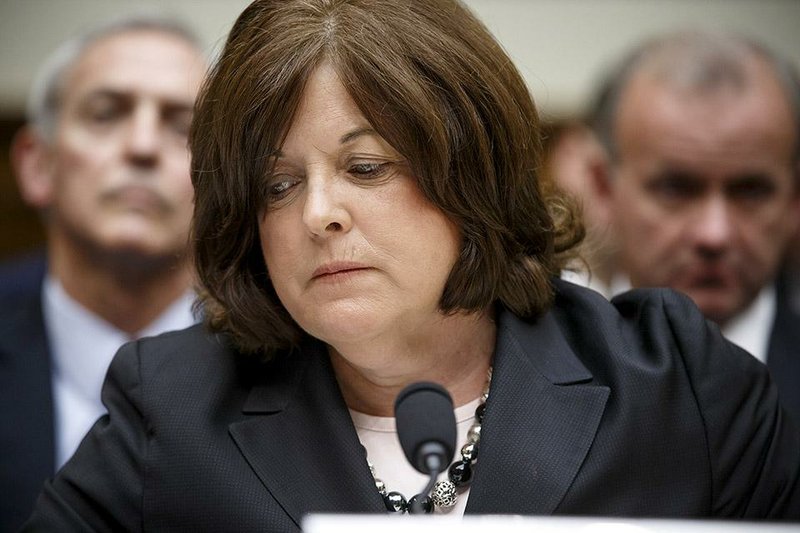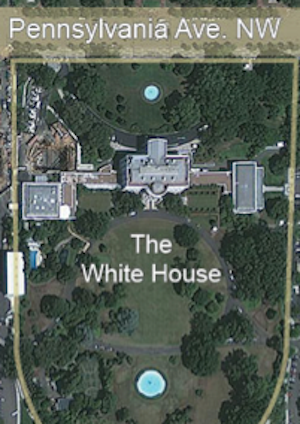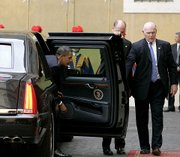WASHINGTON -- Secret Service Director Julia Pierson, the first woman to lead the agency in charge of protecting the president, resigned Wednesday as criticism mounted over a series of security lapses.
Pierson stepped down just 18 months after President Barack Obama selected her to take over a law enforcement agency that already had been tarnished by misconduct by agents.
"I think it's in the best interest of the Secret Service and the American public if I step down," Pierson said after her resignation was announced by the Department of Homeland Security. "Congress has lost confidence in my ability to run the agency. The media has made it clear that this is what they expected.
"I can be pretty stoic about it, but not really," she said. "It's painful to leave as the agency is reeling from a significant security breach."
White House press secretary Josh Earnest said Obama doesn't have a timetable for choosing a replacement. The president agreed with Pierson that "new leadership of that agency was required," he said.
Joseph Clancy, a retired special agent in charge of the presidential protective division of the agency, has been appointed as interim director. Earnest said Clancy is authorized to make any changes he sees as necessary.
Pierson's departure follows a swell of criticism by lawmakers from both parties, including Obama allies Rep. Nancy Pelosi of California, the U.S. House Democratic leader, and Rep. Elijah Cummings of Maryland, the top Democrat on the House Oversight and Government Reform Committee.
Lawmakers quickly made clear that Pierson's resignation and an inquiry ordered by Homeland Security Secretary Jeh Johnson would not end a congressional investigation into the security lapses.
"The Oversight Committee will continue to examine clear and serious agency failures at the Secret Service," said the panel's chairman, Rep. Darrell Issa, R-Calif. "Problems at the Secret Service predate Ms. Pierson's tenure as director, and her resignation certainly does not resolve them."
Cummings commended Pierson for stepping down, saying that her resignation was in the best interest of the Secret Service and the president. But he said more change was necessary, including possibly more resignations.
"I don't want us, after she's left, to say to ourselves that everything is resolved," he said. "Clearly there was a culture there that was not healthy."
The lawmakers' anger stemmed from revelations that an armed intruder, identified as Omar Gonzalez, a 42-year-old Army veteran, managed to get deep inside the White House after scaling the fence on the north side of the building Sept. 19 shortly after Obama had taken off in a helicopter.
While the Secret Service initially said Gonzalez was unarmed and was apprehended after entering the doors of the North Portico, court documents showed he had a folding knife in his pocket, and Pierson acknowledged at a congressional hearing Tuesday that he was able to cross two large halls and get across the East Room before being apprehended.
He also had 800 rounds of ammunition, two hatchets and a machete in his car, prosecutors said.
In court Wednesday, Gonzalez pleaded innocent to federal charges of illegal entry to a restricted area while carrying a dangerous weapon.
Pierson said she spoke to Johnson at his office Wednesday. She tendered her resignation at that meeting, the White House said.
"We met in person, and after that discussion I felt this was the noble thing to do," she said, because it would "take pressure off the organization."
Obama decided the agency needed new leadership "because of the recent and accumulating reports about the performance of the agency," Earnest said.
The breaking point may have come from revelations of a Sept. 16 incident in which the Secret Service unwittingly allowed an armed private security contractor with a criminal record to ride in an elevator with Obama. Agents discovered only after Obama left the area that the contractor was carrying a firearm and had a record.
Earnest said the White House didn't find out about that incident until Tuesday, "just minutes before it was publicly reported." Asked whether that factored into Obama's decision, Earnest would only say that "is part of the recent and accumulating reports to which I'm referring."
Earnest said that while Obama retains full confidence in the Secret Service agents who protect him and his family, he supports Johnson's decision to appoint a panel that will conduct an independent review of the agency's response to the Sept. 19 breach and make recommendations on candidates for the director's job.
Series of Lapses
The September occurrences were the latest in a series of stumbles by the agency dating from the start of Obama's term, including gate-crashers at a state dinner, agents discovered mingling with prostitutes in Colombia and another incident involving late-night drinking.
Lawmakers also have sought more details on why the Secret Service failed to initially identify and investigate another serious security problem in 2011 in which a man fired shots from a rifle at the White House, hitting the building at least seven times.
It wasn't until four days later that the Secret Service realized shots had hit the White House, when a housekeeper noticed broken glass and a chunk of concrete on the floor.
After those problems, Pierson was sworn in March 27, 2013. The same month, three U.S. Secret Service agents were sent home from Amsterdam on the eve of a presidential visit after one of them passed out intoxicated in front of his hotel room.
In an Aug. 8 interview, Pierson expressed confidence that she had begun to turn things around at the agency.
"It's been a year of challenges and success," she said. "In any organization, people are going to make a mistake. But it's important for the public to know that this organization is going to maintain a high degree of standards."
John Magaw, a former Secret Service director, said the steady stream of failures and what he said was Pierson's lackluster testimony during Tuesday's congressional hearing made her departure inevitable.
"Too many things happening under her watch," Magaw said. "Her testimony was a disaster, maybe the worst I have ever seen."
He said Clancy is the right person to take over. "He's a leader," Magaw said.
Clancy has been working in top-level security positions for Comcast Corp. since retiring from the Secret Service in 2011.
Earnest said Clancy would take a leave of absence from his job to return.
Pierson's departure makes her the second consecutive Secret Service director to leave after coming under fire from Congress for lapses at the agency. She follows Mark Sullivan, who retired after a scandal involving agents cavorting with prostitutes while they were in Colombia preparing security for an Obama visit there.
The Secret Service has been part of the Department of Homeland Security since that agency was created after the Sept. 11, 2001, terrorist attacks. Homeland Security also houses the Transportation Security Administration, which controls airport security, and Customs and Border Protection, an agency that has been scrutinized amid an influx of unaccompanied child migrants entering the U.S. at the southwest border.
The Secret Service has broad jurisdiction including protecting the president and foreign dignitaries as well as investigating counterfeiting and credit-card fraud. The agency describes itself in its strategic plan as "one of the oldest federal law enforcement agencies in the country and ranks among the most elite in the world."
Information for this article was contributed by Del Quentin Wilber, Angela Greiling Keane, James Rowley, Andrew Zajac, David McLaughlin and Derek Wallbank of Bloomberg News; Eileen Sullivan, Alicia A. Caldwell, Erica Werner, Josh Lederman and Calvin Woodward of The Associated Press; and by Michael S. Schmidt, Michael D. Shear, Emmarie Huetteman and Julie Hirschfeld Davis of The New York Times.
A Section on 10/02/2014


